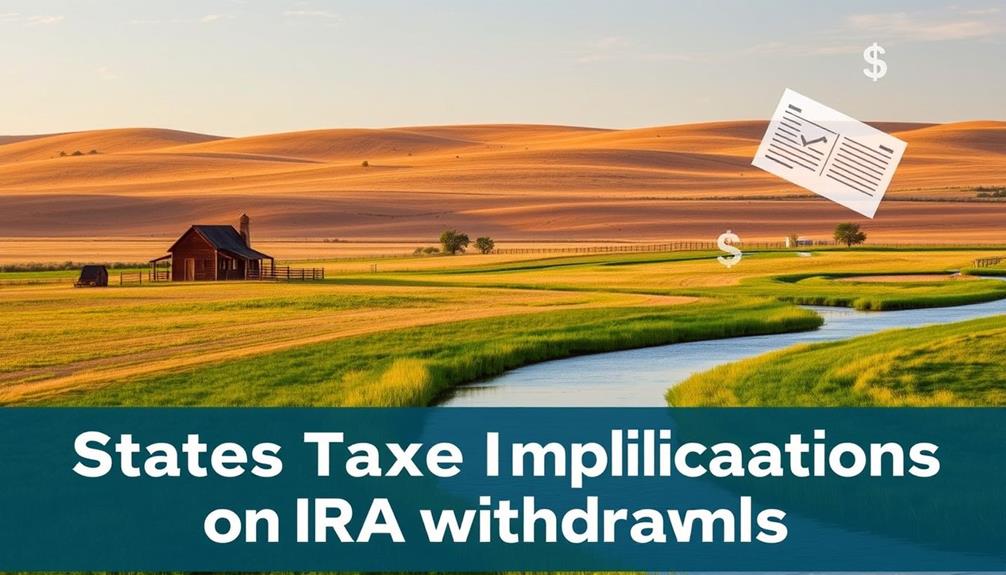When you make a withdrawal from a traditional IRA in Vermont, you will be subject to state taxes as these distributions are fully taxable as ordinary income. The tax rate can range from 3.35% to 8.75%, depending on your adjusted gross income (AGI). If you are under 59 and a half and make an early withdrawal, there is also a 10% federal penalty. Roth IRA withdrawals may be tax-free under certain conditions. Proper planning can help minimize your tax liability and ensure you are aware of any exemptions, particularly if you are a senior. Stay tuned for more insights on effectively managing your retirement income.
Key Takeaways
- Traditional IRA withdrawals are fully taxable as ordinary income in Vermont, affecting your adjusted gross income (AGI).
- Early withdrawals before age 59½ incur a 10% federal penalty, but state tax treatment remains unchanged.
- Seniors aged 65 and older may qualify for additional tax exemptions on certain retirement income.
- Vermont allows a $10,000 exemption on specific retirement income for eligible taxpayers, which can lower taxable income.
- Accurate reporting on forms like IN-111 and 1040 is essential for utilizing deductions and exemptions effectively.
Overview of IRA Withdrawals in Vermont

When you're considering IRA withdrawals in Vermont, it's important to understand how they'll impact your finances.
Traditional IRA withdrawals are treated as taxable income, meaning they'll be included in your adjusted gross income (AGI) and subject to Vermont's state income tax rates, which range from 3.35% to 8.75%. This can greatly affect your overall tax liability, especially if your AGI is already on the higher side.
If you're thinking about withdrawing from a Roth IRA, you might've a different experience. Roth IRA withdrawals can be tax-free if they qualify as distributions made after you're 59½.
However, if you take early withdrawals from a traditional IRA before this age, be prepared for an additional 10% federal penalty tax, as Vermont doesn't offer specific exemptions for these situations.
It's vital to plan your IRA withdrawals carefully, as they can influence not only your state income tax but also your eligibility for certain tax benefits.
State Income Tax Rates

Understanding Vermont's state income tax rates is essential for retirees planning their financial future. The state imposes income tax rates ranging from 3.35% to 8.75%, which depend on your income levels.
When evaluating IRA distributions, it's crucial to recognize that withdrawals from traditional IRAs are taxed as ordinary income, making your retirement income taxable in Vermont.
If you're a qualifying taxpayer, the first $10,000 of income from certain retirement systems may be exempt from state taxes, which can be beneficial as you plan your withdrawals.
Additionally, Social Security benefits are also taxable in Vermont, but exemptions exist based on your adjusted gross income (AGI) thresholds, which vary by filing status.
Understanding this sliding scale of tax brackets can help you navigate your tax liability effectively as you approach retirement. The state's tax structure could impact your overall financial plan, so be sure to reflect on how your age and financial situation might influence your tax obligations.
Planning strategically around these state income tax rates can lead to more effective management of your retirement funds.
Tax Treatment of Traditional IRA Withdrawals

Withdrawing funds from a traditional IRA can greatly impact your tax situation in Vermont. When you take withdrawals from your traditional IRA, those amounts are considered taxable income. This means they get added to your adjusted gross income (AGI) for the year, and your total income could determine your state income tax rate, which ranges from 3.35% to 8.75%.
It's essential to remember that Vermont doesn't provide specific exemptions for traditional IRA withdrawals, so these funds are fully taxable at the state level.
If you're under 59½ and consider early withdrawals, be aware that while you may face a 10% federal tax penalty, this doesn't affect state tax treatment.
When planning for retirement income, consider how traditional IRA withdrawals will affect your overall tax liability. As a retiree, you'll want to take into account your total income, including any withdrawals, to avoid unexpected tax burdens.
Being proactive about your tax situation will help you make informed decisions about your retirement strategy in Vermont.
Social Security Benefits and Tax Exemptions

When it comes to Social Security benefits in Vermont, your filing status can notably affect your tax exemptions.
If your adjusted gross income hits certain thresholds, you might find your benefits fully or partially exempt from state income tax.
Understanding these income limits and their implications is essential for smart retirement income planning.
Filing Status Impacts Exemption
Maneuvering the tax landscape for Social Security benefits and exemptions can be intricate, especially since your filing status considerably impacts eligibility. Understanding how filing status affects the Social Security Exemption is essential for maximizing your retirement income.
For married or civil union joint filers, the full exemption applies if your adjusted gross income (AGI) is up to $65,000, phasing out between $65,000 and $75,000. Single filers enjoy a full exemption with an AGI up to $50,000, phasing out from there.
Remember, you can only claim one exemption among Social Security, Military Retirement, and Other Retirement System Exemptions.
Here are some key points to reflect on:
- Your filing status determines the income thresholds for exemptions.
- Social Security benefits may be taxable based on your AGI.
- Civil Service Retirement System (CSRS) income can be excluded based on filing status.
- Other eligible retirement systems also allow exclusions up to $10,000, depending on income.
Income Thresholds for Benefits
Understanding income thresholds is essential for maximizing your Social Security benefits and tax exemptions. In Vermont, if you're a married or civil union joint filer, your Social Security retirement benefits are fully exempt from state taxation if your adjusted gross income (AGI) is up to $65,000. This exemption starts phasing out between $65,000 and $75,000.
For other filing statuses, the full exemption applies to those with an AGI up to $50,000, phasing out between $50,000 and $60,000.
Eligible taxpayers can also claim a $10,000 tax exemption on retirement income from the Civil Service Retirement System (CSRS) if their income is $75,000 or less for joint filers or $60,000 or less for others. The same $10,000 exemption applies to income from certain other retirement systems, following the same income thresholds.
Additionally, taxpayers aged 65 or older can receive an extra $1,000 standard deduction, which adjusts annually for inflation, if they qualify for the federal deduction.
Understanding these income tax rates and exemptions can greatly affect your retirement income, allowing you to keep more of what you've earned.
Retirement Income Tax Considerations
How can retirees effectively navigate the complexities of state tax implications on retirement income? Understanding Vermont's tax landscape can help you manage your finances more effectively.
Importantly, Social Security benefits are fully exempt from state taxes for married or civil union joint filers with an AGI up to $65,000, and for other filers, the limit is $50,000. If your income exceeds these thresholds, the exemption gradually phases out.
Consider these key points to optimize your retirement income tax strategy:
- You can claim only one exemption among Social Security, Military Retirement, or Civil Service Retirement, impacting your overall tax planning.
- Vermont allows an exclusion of the first $10,000 of retirement income from the Civil Service Retirement System for eligible filers.
- An additional $1,000 standard deduction is available for those aged 65 or older, reducing your taxable income further.
- Use the Vermont Schedule IN-112 worksheet to verify eligibility for retirement income exemptions and maximize your tax benefits.
Retirement Income Exemptions for Seniors

As you enter retirement, it's crucial to be aware of the various income exemptions available to seniors, particularly when it comes to taxes. In Vermont, seniors can benefit considerably from specific exemptions that reduce taxable income from retirement sources.
For instance, if you're 65 or older, you'll receive an additional $1,000 standard deduction, which can lower your overall tax burden.
When it comes to retirement income, Vermont allows you to exclude the first $10,000 from certain pension income sources, such as the Civil Service Retirement System, provided your income meets specific thresholds.
For joint filers, that limit is $75,000, while other filers have a cap of $60,000. Additionally, Social Security benefits are fully exempt for married couples with an Adjusted Gross Income (AGI) up to $65,000, tapering off at $75,000.
Additional Deductions for Retirees

Retirees in Vermont can take advantage of additional deductions that further reduce their tax liabilities. If you're 65 or older, you might qualify for an additional $1,000 standard deduction, which can greatly lower your taxable income.
Also, eligible seniors may benefit from property tax exemptions, helping to ease your financial burden based on income and property ownership.
Here are some key points to take into account:
- The Civil Service Retirement System (CSRS) allows an exclusion of the first $10,000 of retirement income for joint filers earning $75,000 or less.
- Other filing statuses can exclude the first $10,000 of retirement income for those earning $60,000 or less.
- Similar exclusions apply for other eligible retirement systems, providing further tax relief from pensions not covered by Social Security.
- It's important to check your eligibility using the Vermont Schedule IN-112 worksheet to make sure you maximize available deductions and exemptions related to your retirement income.
Filing Requirements for Retirees

When you're filing your taxes as a retiree, it's essential to know which forms you'll need, especially in Vermont.
You must report your income, including IRA withdrawals, on Form IN-111 if your gross income exceeds the threshold for your filing status.
Understanding these requirements will help guarantee you're accurately reporting your income and taking advantage of any potential deductions.
Required Tax Forms
Steering through the required tax forms for IRA withdrawals can feel overwhelming, but understanding your obligations is essential for a smooth filing process.
First and foremost, you'll need to report any IRA withdrawals on your Form 1040. This applies regardless of your age, as these distributions are considered taxable income. If you're under 59½ and take an early distribution, be prepared to attach Form 5329 for possible additional taxes.
At age 72, you must begin taking Required Minimum Distributions (RMDs) from your IRA, which also need to be reported on your tax return.
Additionally, if you've made any Qualified Charitable Distributions (QCDs) from your IRA, don't forget to complete Form 8606 to accurately report the taxable amounts.
To help navigate your state tax obligations, consider using Vermont Schedule IN-112 to check your eligibility for retirement income exemptions.
Here's a quick checklist for your required forms:
- Form 1040 for reporting IRA withdrawals
- Form 5329 for early distributions, if applicable
- Form 8606 for Qualified Charitable Distributions
- Vermont Schedule IN-112 for retirement income exemptions
Income Reporting Essentials
Understanding the income reporting essentials is essential for managing tax obligations tied to IRA withdrawals. In Vermont, all distributions from traditional IRAs are subject to state tax and must be reported on Form 1040, regardless of your age. This includes any required minimum distributions (RMDs) if you're 70½ or older, which are taxed as ordinary income.
If you incur a 10% additional tax on early distributions from your IRA, you'll need to attach Form 5329 to your tax return to report this. It's important to verify you meet federal filing requirements to claim any state exemptions or deductions related to your IRA withdrawals.
Vermont does offer some relief; if you qualify, the first $10,000 of retirement income from specific retirement systems can be exempt from state tax. Eligibility depends on your income level, so be sure to check your status.
Impact of IRA Withdrawals on Property Taxes

Maneuvering the tax landscape in Vermont, retirees should be aware that IRA withdrawals can considerably influence their property tax obligations. When you withdraw funds from your IRA, it increases your adjusted gross income (AGI), which might affect your eligibility for income-based property tax exemptions or credits.
This can be particularly significant for seniors, as Vermont's effective property tax rate averages 1.89%, potentially pushing you into a higher tax bracket.
Here are some key points to reflect on:
- Increased AGI from IRA withdrawals may limit your eligibility for property tax relief programs for low-income seniors.
- If you're 65 or older, you could qualify for an additional $1,000 standard deduction, which helps offset some tax implications.
- Local municipalities may offer additional tax credits for seniors, but these can also be influenced by your income from IRA distributions.
- Always check if your homestead declaration is up-to-date to maximize potential benefits.
Understanding these factors can help you navigate the complexities of property tax responsibilities in Vermont, especially as they relate to your IRA withdrawals.
Resources for Vermont Retirees

For Vermont retirees, accessing the right resources can make a significant difference when maneuvering the complexities of tax implications related to IRA withdrawals.
One key resource is the Vermont Department of Taxes, which provides helpful worksheets like Schedule IN-112 to determine eligibility for various retirement income tax exemptions.
Seniors can also take advantage of free tax assistance programs, such as the AARP Foundation Tax-Aide and IRS VITA/TCE, specifically designed to help retirees navigate tax retirement issues.
If you're 65 or older, remember you may qualify for an additional $1,000 deduction on your Vermont state tax return, provided you qualify for the federal standard deduction.
Beyond income tax, the Vermont Office of Veterans Affairs offers property tax exemptions for disabled veterans, aiding in your financial planning.
Additionally, the Vermont Department of Taxes website features online tools and resources that break down your tax obligations and potential benefits related to IRA withdrawals.
Frequently Asked Questions
Are IRA Distributions Taxable in Vermont?
Yes, IRA distributions are taxable in Vermont. Traditional IRA withdrawals count as taxable income, while Roth IRA withdrawals can be tax-free if certain conditions are met, such as age and account duration.
Do I Have to Pay State Taxes on an IRA Withdrawal?
Yes, you'll have to pay state taxes on an IRA withdrawal, especially for traditional IRAs, as they're considered taxable income. Roth IRA withdrawals might be tax-free if specific conditions are met.
What States Have Mandatory State Tax Withholding on IRA Distributions?
Many states, including California and New York, require mandatory state tax withholding on IRA distributions. You'll face varying rates based on your income tax bracket, so it's vital to check your specific state's regulations.
Do I Have to Pay Taxes When I Withdraw From My Traditional Ira?
About 90% of retirees face taxes on Traditional IRA withdrawals. Yes, you'll pay taxes when you withdraw from your Traditional IRA, as these distributions count as ordinary income and affect your overall tax liability.
Conclusion
Steering IRA withdrawals in Vermont can feel like walking a winding path through a dense forest. By understanding state tax implications, you can avoid hidden pitfalls and emerge into the clear. Remember, your hard-earned retirement savings deserve protection from unnecessary taxes. As you plan your withdrawals, think of them as seeds you're planting for a flourishing future. With the right guidance, you can cultivate a bountiful retirement, ensuring your golden years shine brightly without the shadow of tax worries.









